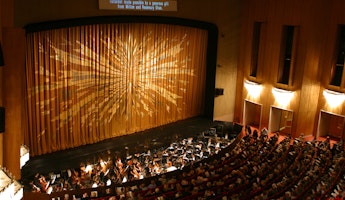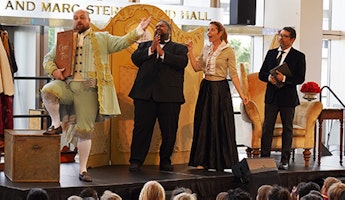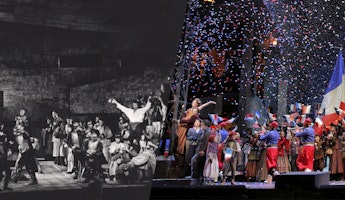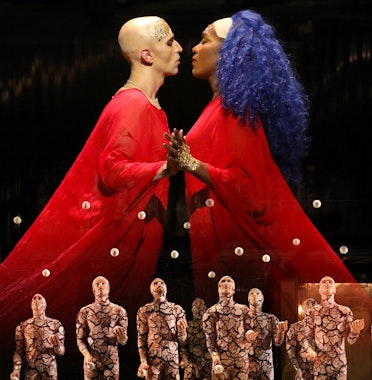Blog
June 13, 2025
Behind the Masterpiece: Rigoletto
Every masterpiece carries with it a hidden world of stories—struggles, triumphs, and creative sparks that shaped it into what we see today. While the drama of Rigoletto unfolds onstage, an equally compelling story lives behind the curtain. These behind-the-scenes moments—some bold, some quiet—offer a deeper appreciation for Verdi’s groundbreaking work.
As Rigoletto returns to light up our stage, we invite you to step into that world. From the opera’s embattled beginnings and its brush with censorship to LA Opera’s own legacy of bringing this powerful piece to life, these tales illuminate the enduring brilliance of Verdi’s vision. Whether you're a lifelong fan or experiencing Rigoletto for the first time, you’ll find something here to deepen your connection to this timeless work.
Verdi’s Uphill Battle
When Giuseppe Verdi set out to adapt Victor Hugo’s scandalous 1832 play The King Amuses Himself, he called its central figure “one of the greatest characters the theater can boast—in any country and in all of history.” But turning that explosive material into an opera wasn’t going to be easy.
Set in a corrupt royal court and brimming with dark themes, the libretto for Rigoletto raised alarm bells among Venice’s strict censors. Librettist Francesco Maria Piave had to make numerous changes just to get it past the gatekeepers. Their response to the first draft? Brutal. They expressed “profound regret” that artists of Verdi and Piave’s caliber had chosen such “revolting immorality and obscene triviality” as their subject. The fight was on.
Francesco Maria Piave: Verdi’s Loyal Wordsmith
A close collaborator and trusted friend, Francesco Maria Piave wrote the librettos for ten Verdi operas, including La Traviata, Macbeth, and Simon Boccanegra. For Rigoletto, he bore the brunt of the negotiations with the Venetian censors—a task that led to a serious scolding from Verdi when the draft was initially rejected.
Though his writing days ended abruptly after a debilitating stroke in 1867, Verdi remained steadfast. He not only supported Piave and his family through years of hardship, but also paid for his funeral in 1876—a rare gesture of loyalty and gratitude in an often cutthroat world.
The First Rigoletto: A Role—and a Panic—for the Ages
Rigoletto is now hailed as the definitive baritone role in opera—but it didn’t start out that way. Verdi chose Felice Varesi, who had already starred in Macbeth, to bring the tormented jester to life. But on opening night, nerves nearly unraveled the entire performance.
Uncomfortable in costume and rattled by fear, Varesi froze before his entrance. Verdi had to physically push him onstage—causing him to stumble dramatically. The audience erupted in applause, mistaking the moment for a bold theatrical flourish. Two years later, Varesi would go on to originate another major Verdi role: Germont in La Traviata.
A Controversial Hit
Despite early skepticism and mixed reviews, the 1851 premiere of Rigoletto at Venice’s Teatro La Fenice was a triumph. Audiences couldn’t get enough—the opera toured six Italian cities that same year and expanded into more, including Vienna, the following season.
“Everyone cried out at the idea of putting a hunchback on the stage,” Verdi wrote later. “Well, there you are. I was very happy to write Rigoletto... and it is my best opera.” (Of course, he still had 11 more to go.)
LA Opera’s Rigoletto Premiere
Rigoletto had its LA Opera premiere in 1993, headlined by the legendary Justino Díaz in his very first performance of the title role. Variety praised his portrayal for its emotional depth and vocal richness, calling his baritone “a rich, dimensional instrument.”
Already known for originating the role of Antony in Barber’s Antony and Cleopatra at the new Metropolitan Opera House’s grand opening in 1966, Díaz was no stranger to LA audiences. He’d graced our stage in productions of Macbeth, Otello, Tosca, and The Girl of the Golden West—and would return again for El Gato Montés and a revival of Tosca.
To see Rigoletto, with soprano Kathryn Lewek making her LA Opera debut as Gilda starting June 18, click here.








/03-cosi/_dsc0996_pr.jpg?format=auto&fit=crop&w=345&h=200&auto=format)














